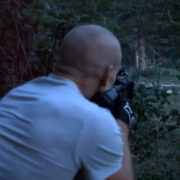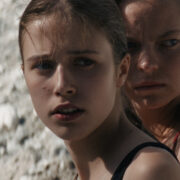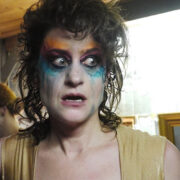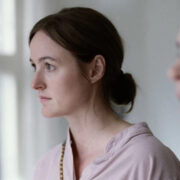NYFF63: It Was Just an Accident, If I Had Legs I’d Kick You, Sound of Falling
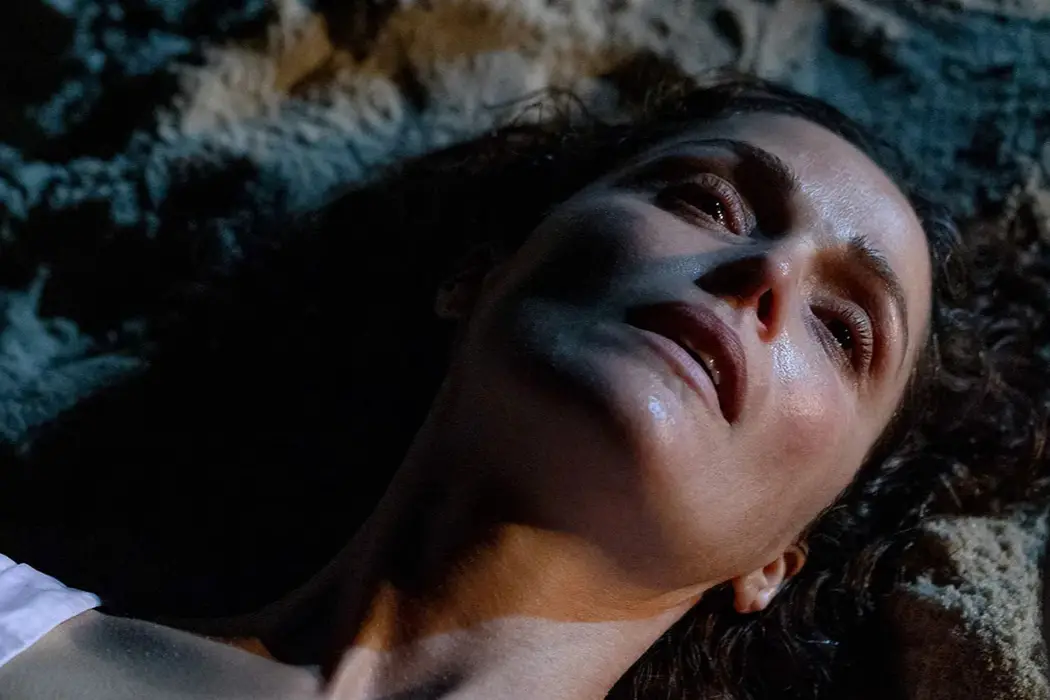
Lee Jutton has directed short films starring a killer toaster,…
On the surface, an Iranian political thriller, a dark psychological comedy about motherhood, and an epic tale of multiple generations of German women might sound radically different; however, these three selections from the Main Slate at this year’s New York Film Festival actually have a lot in common. Mainly, they all deal heavily with trauma, how we deal with it in the moment, and how it can continue to linger, no matter how hard you try to submerge it within your mind and move on. Read on for my thoughts on the latest works from filmmakers Jafar Panahi, Mary Bronstein, and Mascha Schilinski.
It Was Just an Accident (dir. Jafar Panahi)
Filmed in secret by Iranian dissident director Jafar Panahi, It Was Just an Accident was awarded the Palme d’Or at this year’s Cannes Film Festival and applauded for its pointed examination of the moral conflict faced by a group of former political prisoners who have kidnapped the man they believe to be their former interrogator and torturer. Knowing that Panahi’s own experiences in prison are deeply interwoven throughout the film makes it extra hard to critique its depiction of how these people wrestle with their lasting trauma. But as I previously noted after watching Agnieszka Holland’s Green Border, the importance of a film’s subject matter doesn’t automatically confer greatness upon it, and while I found much to admire about It Was Just an Accident, I was also left wanting more.
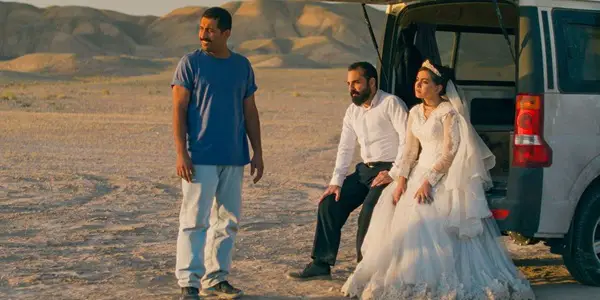
The accident referred to in the film’s title occurs when a family accidentally hits a dog on a dark road while driving home at night. The resulting damage to the car leads them to stop at a garage for help, where one of the mechanics, Vahid (Vahid Mobasseri) hears the squeaking sound of the driver’s artificial leg and is immediately transported back in time to when he was a political prisoner, and a harsh interrogator known as Eghbal (Farsi for peg leg) tortured him so violently that he now suffers from permanent kidney damage. Believing this man (Ebrahim Azizi) to be Eghbal, Vahid follows him, abducts him, and prepares to bury him alive. But when doubt creeps into his mind—after all, he was blindfolded for the entirety of his torture and never saw Eghbal’s face—Vahid sets out to find some fellow former prisoners who may be able to confirm Eghbal’s identity.
What follows is a screwball odyssey full of absurdist humor (such as the ongoing necessity of paying bribes via handheld credit card terminal because no one carries cash) and longwinded political monologues, the former of which highlights the darkly comic undertones to be found in such a traumatic situation and the latter of which make you feel as though you are being repeatedly hit over the head with an axe handle. The script is simply too heavy-handed, full of long stretches of dialogue that would feel more at home on stage than on screen, delivered with varying believability by the film’s cast of characters, which includes wedding photographer Shiva (Mariam Afshari), bride Goli (Hadis Pakbaten), groom Ali (Majid Panahi), and their fiery friend Hamid (Mohamad Ali Elyasmehr).
There is an intriguing question at the heart of It Was Just an Accident: are victims of the regime justified in seeking revenge, or does that desire for vengeance make them just as bad as the people they are fighting against? It all culminates in one of the most haunting final sequences in recent cinematic history; I just wish that more of the scenes leading up to that moment were handled with the same elegant touch, though I also understand why Panahi’s righteous fury over the way he and so many others have suffered at the hands of the regime may have made that impossible.
If I Had Legs I’d Kick You (dir. Mary Bronstein)
Mary Bronstein’s If I Had Legs I’d Kick You depicts motherhood in Montauk the same way David Lynch’s Eraserhead depicted fatherhood in Philadelphia: as an existential nightmare that is nearly impossible to wake up from. Carried by a furious, fantastic performance from Rose Byrne, the film explores the unraveling of a woman struggling under the weight of her daughter’s mysterious illness, her husband’s perpetual absence, and her apartment’s crumbling ceiling. (That’s right, the sky is literally falling on her.) It’s often extremely funny, just as often (if not more so) extremely disturbing, and never, ever boring.
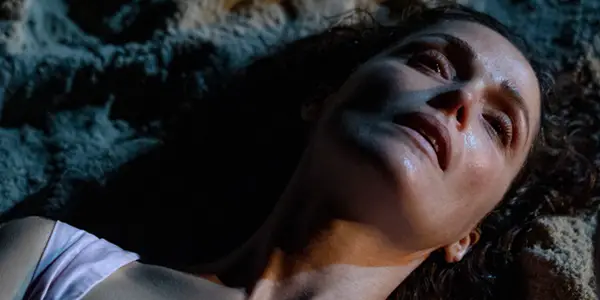
While her husband is away for long stretches working as a ship captain, therapist Linda (Byrne) is stuck shuttling her shrill, demanding young daughter (Delaney Quinn, whose face remains off camera for most of the film’s running time, often making her feel more like a fever dream than a real person) to specialized treatment for her inability to eat. Each time, Linda is lectured by the doctor (Bronstein) over her daughter’s lack of progress in gaining weight, without which she’ll never be able to have the tube through which she receives grotesque liquid nutrition removed from her stomach. From there, Linda goes to her job as a therapist, where she spends almost as much time in the office of her colleague (a pitch-perfect Conan O’Brien) receiving treatment herself as she does with her patients, which includes a young mother (Danielle Macdonald) struggling with her own perceived lack of ability to protect her newborn son from harm.
When the ceiling of their apartment crashes down upon them in almost apocalyptic fashion, Linda and her daughter move into a motel, where Linda spends most of her evenings sneaking out to drink bottle upon bottle of wine while awkwardly socializing with motel superintendent James (A$AP Rocky, in his second impressive performance of the year following Spike Lee’s Highest 2 Lowest). As her situation grows increasingly overwhelming, Linda’s behavior grows increasingly unhinged; in one of her darkest moments, she tells her therapist that she thinks she is one of those people who is just not meant to be a mother. Everyone in her life is constantly telling her what to do, but what they’re aren’t doing is telling her how to do it, and how to do it all when there’s too much of it for one woman to reasonably handle without losing her mind.
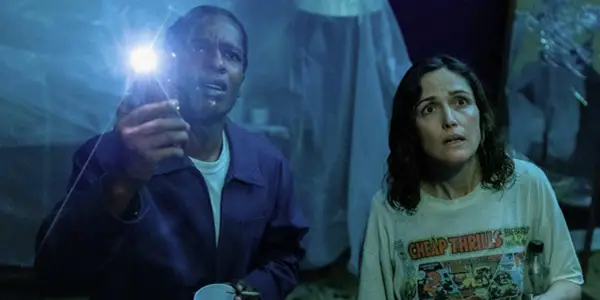
It’s no surprise that the frantic tone of If I Had Legs I’d Kick You feels like that of a female-focused Uncut Gems; Bronstein is married to frequent Safdie brothers collaborator Ronald Bronstein, both Safdies co-starred in her directorial debut, Yeast, and Josh Safdie is credited as a producer here. Like the onslaught of stressful events in Linda’s life, the film is unrelenting in its depiction of the chaos of motherhood and the guilt that plagues you when you feel responsible for things not going according to plan. In one scene that manages to straddle the line between hilarious and heartbreaking, Linda throws a group therapy session for parents of sick kids into an uproar when she bluntly informs them that actually, yes, they are all to blame for their kids’ conditions. Yet there is also a surreality to the story that is undeniably Lynchian, especially when it comes to the gaping hole in the apartment ceiling that, like everything else in Linda’s life, only seems to get larger and more oppressive each time she goes to look at it.
Byrne is magnificent throughout, making Linda a strangely sympathetic character even in her most despicable moments, in large part because her situation is so outrageous that you can’t blame her for acting out the way she does but also because she is so snarky and funny. The rest of the ensemble cast is admirable in support, especially Macdonald, who brings a tragic desperation to her role as an anxious mother who needs more from Linda than she is capable of providing. The film thrives until its final act, when it collapses under the weight of everything that has happened thus far, with an ending that seems unsatisfyingly simple given the complexity of Linda’s life. Despite this, I strongly recommend seeing If I Had Legs I’d Kick You—then, when it’s over, take a cold shower, and never watch it again, unless you really like feeling on the verge of a panic attack for two hours. Still, as panic attacks go, it’s remarkably well done.
Sound of Falling (dir. Mascha Schilinski)
The most difficult thing about writing about films is when you encounter one so extraordinary that it feels beyond the power of ordinary words to describe it. You feel as though you cannot do it justice, and so it would be better not to try to write about it at all. Yet I love Mascha Schilinski’s Sound of Falling—a sprawling tale of the specters of patriarchal violence that haunt generation after generation of women in one German farmhouse—so much that I feel obligated to try to convey what makes it such a special film, and one of my favorites so far this year.
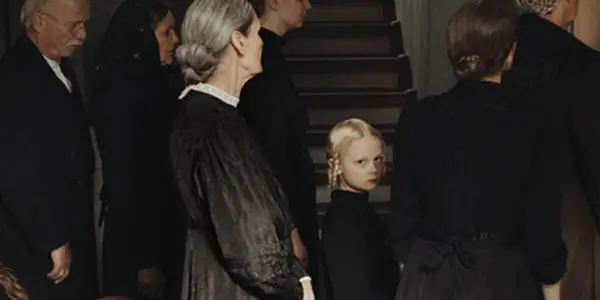
Sound of Falling spans approximately a century: from the early twentieth century to the time immediately following World War II, from the era of the German Democratic Republic to the present day. The story is not told chronologically, but cuts back and forth throughout time, allowing the lines between past and present to blur. Certain characters are revealed to be ancestors and descendants of others; certain phrases echo across the decades, and certain actions are repeated, without characters knowing that they’re following in their forebearers’ footsteps. The complex, many-layered sound design goes a long way towards making the transitions between eras feel eerily magical, with a deep rumbling like thunder signifying that we’re about to slip backward or forward in time. (Sound of Falling often feels reminiscent of the German time-travel drama Dark; in my opinion, that’s a good thing, though yours may differ.)
Throughout the film, we witness a variety of horrors, albeit often obliquely; Schilinski is too sensitive a storyteller to rely heavily on explicit depictions of trauma for cheap thrills, instead focusing on the way these experiences leave lingering scars on the psyche. Maids are forcibly sterilized so that when the men of the household line up to rape them, they won’t get pregnant and thus miss work. Women walk into the nearby river when World War II comes to an end, fearing death less than they do the conquering army heading their way. A young woman coming of age in the GDR (Lena Urzendowsky) fantasizes about letting farm equipment grind her into the earth to escape from ongoing sexual abuse, while a girl on the cusp of puberty today (Laeni Geiseler) notices the way grown men are starting to look at her body and, for the first time, feels compelled to cover herself. Things change, but they also stay the same; women’s lot improves in some ways, but not all.
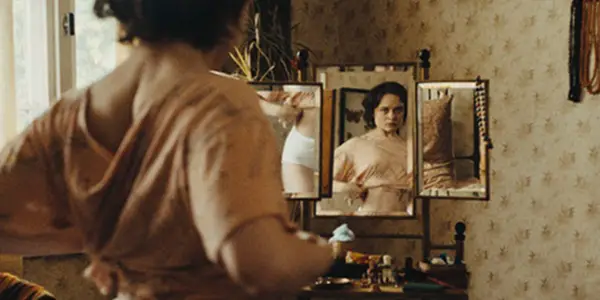
Different voices chime in to provide narration in Sound of Falling, sometimes from beyond the grave. The ones who survive are haunted by the ghosts of those who didn’t; grown Irm (Claudia Geisler-Bading) wonders if part of her did indeed die when she surfaced while her sister drowned, and little Alma (Hanna Heckt) attempts to recreate the post-mortem portrait of a long-gone relative while she herself is still living. This probably all sounds very bleak, and it is, but it’s also very beautiful. The camera often takes the position of a voyeur, peering at the characters through windows and around curtains; sometimes, the scenes are framed through doorways as though we are examining a diorama, adding to the feeling that these characters’ fates are not entirely within their control, but subject to something strange and supernatural that lurks in the shadows of the house.
The performances are stunning across the board, especially Urzendowsky’s poignant embodiment of a young woman who figures that if she can’t escape her abuser, she can at least take advantage of his obsession with her burgeoning sexuality, the unfortunate result of which is outside observers seeing her as a willing participant instead of the victim that she really is. With its leisurely running time (over two and a half hours) and dark subject matter, Sound of Falling may not be for everyone, but I couldn’t help but fall under its spell. It’s a feminist horror film disguised as a prestige period drama, and it has continued to haunt me in the same way trauma haunts its characters throughout their long century.
It Was Just an Accident, If I Had Legs I’d Kick You, and Sound of Falling are screening as part of the Main Slate at the 63rd New York Film Festival, which runs from September 26 to October 13, 2025.
Does content like this matter to you?
Become a Member and support film journalism. Unlock access to all of Film Inquiry`s great articles. Join a community of like-minded readers who are passionate about cinema - get access to our private members Network, give back to independent filmmakers, and more.
Lee Jutton has directed short films starring a killer toaster, a killer Christmas tree, and a not-killer leopard. Her writing has appeared in publications such as Film School Rejects, Bitch: A Feminist Response to Pop Culture, Bitch Flicks, TV Fanatic, and Just Press Play. In addition to movies, she's also a big fan of soccer, BTS, and her two cats.


